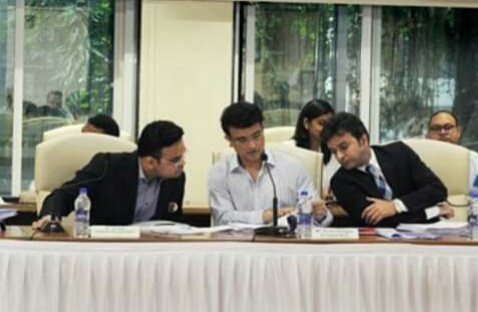The Board of Control for Cricket in India (BCCI) and the England and Wales Cricket Board (ECB) will jointly take their fight to the International Cricket Council (ICC), opposing the global body’s revised governance structure, financial model and the Future Tours Programme (FTP) that have been proposed for the 2023-2031 cycle.
It is learnt that the two boards are confident about getting the Cricket Australia (CA) on their side. The ‘Big Three’ revival appears to be on the anvil. The BCCI and the ECB discussed the ICC matters during their meeting at Lord’s earlier this month.
“The BCCI and the ECB had a very good meeting and both are on the same page. The ECB also feels the same way like us about things that are happening at the ICC. “They (ECB) are also not happy and we (BCCI) are also not happy,” a top BCCI official told, adding: “Most likely Cricket Australia (CA) will be with us as well soon.”
The meeting between the BCCI office-bearers – president Sourav Ganguly secretary Jay Shah and treasurer Arun Dhumal – and their ECB counterparts – chairman Colin Graves and his team – agreed on rejecting the changes proposed by the ICC.
“All these three important cricket boards have been undermined (by the ICC). Nobody is ready to take it lying down,” the official said. He, however, refused to call it the ‘Big Three’ revival. “The BCCI knows its position in world cricket and will restore it. And the three important boards will work for the benefit of world cricket.”
The BCCI will have a meeting with the CA chairman Earl Eddings and his delegation on the sidelines of Australia’s three-match ODI series here commencing January 14.
According to sources, apart from the ICC matters, the two boards will also discuss the possibility of playing day-night Tests during India’s tour of Australia – from November to January 2020-21 – and the BCCI might agree to playing one pink-ball Test under lights, preferably in Adelaide, during the four or five-match series.
The ICC issues will be a significant part of the discussion as well. During its Board meeting in Dubai in October, the global body had proposed eight flagship events in eight years – from 2023 onwards – as part of their next broadcast rights package. This was done ostensibly to highjack the BCCI’s share of revenue from potential broadcasters for the next rights cycle.
The ICC has also kept the BCCI out of its newly-formed working group that will look into the future governance structure of the world body. Both the ECB and the CA, along with the BCCI, have already raised objection to the proposed FTP, as they feel it would “marginalise” bilateral cricket.
India’s grudge against the Shashank Manohar-helmed ICC runs even deeper. Under Manohar, who was also the board president, the ICC disbanded the ‘Big Three’ model (designed by his predecessor N Srinivasan) that saw the BCCI’s projected revenue come down from a staggering $570 million to a little over $400 million. There was widespread resentment on the measure.
This is despite the fact that India contributes to over 70 per cent of the ICC’s revenue. Also, according to a cricket board insider, an amount in excess of $27 million from the ICC – participation fee etc. – is overdue. As this paper reported, the BCCI would oppose Manohar’s re-election as the ICC chairman for a third term, if he decides to contest.
Under the changed financial model, the ECB is getting $139 million, while the CA is expected to take home $128 million, on a par with Pakistan, West Indies, New Zealand, Sri Lanka, and Bangladesh. The BCCI, the ECB and the CA will put up a united front, but as the official informed, no extra tournament involving the three giants hasn’t been planned yet.







